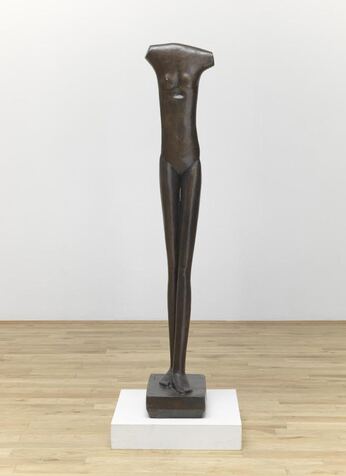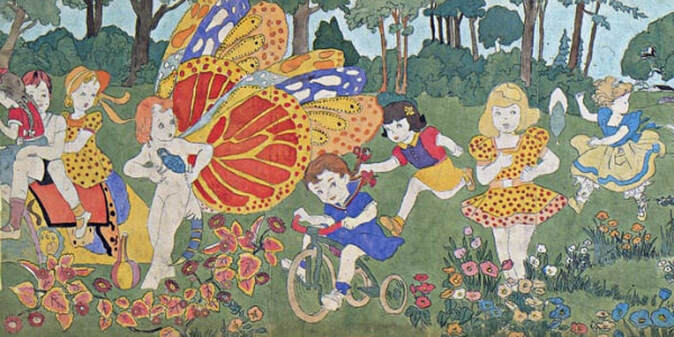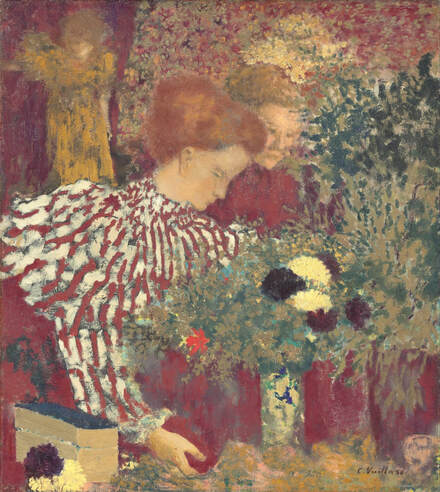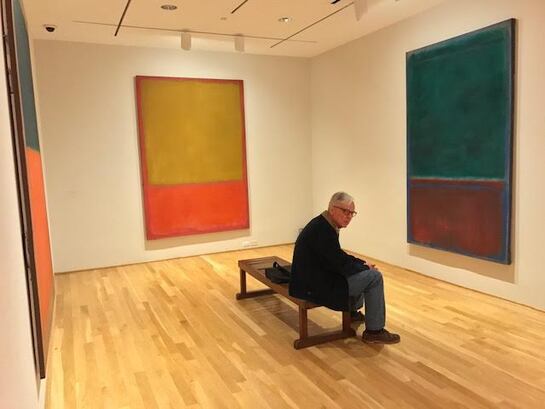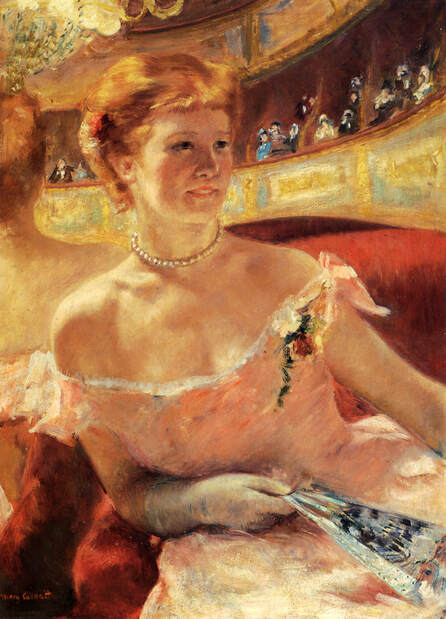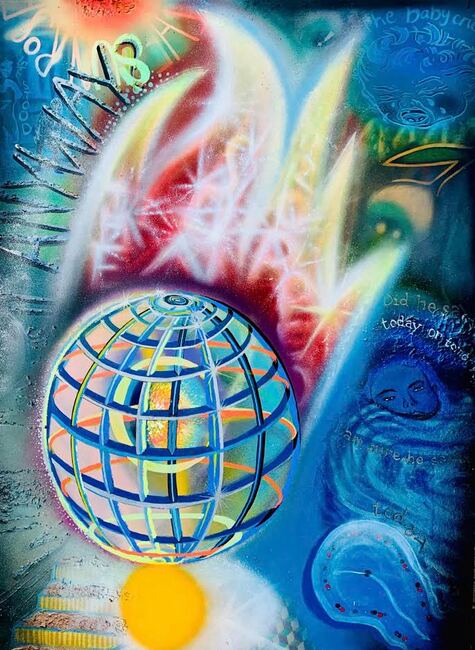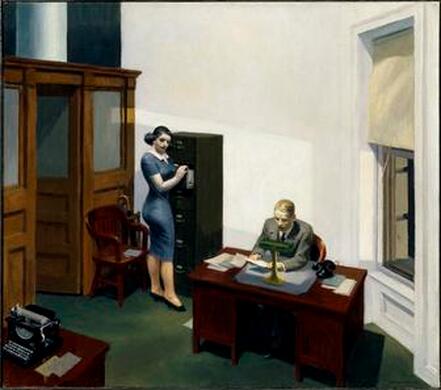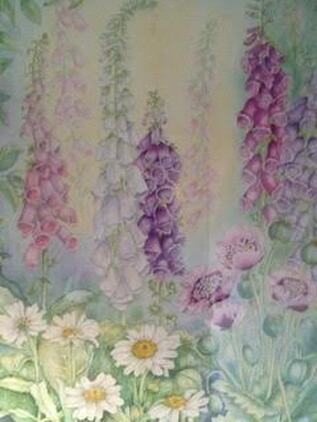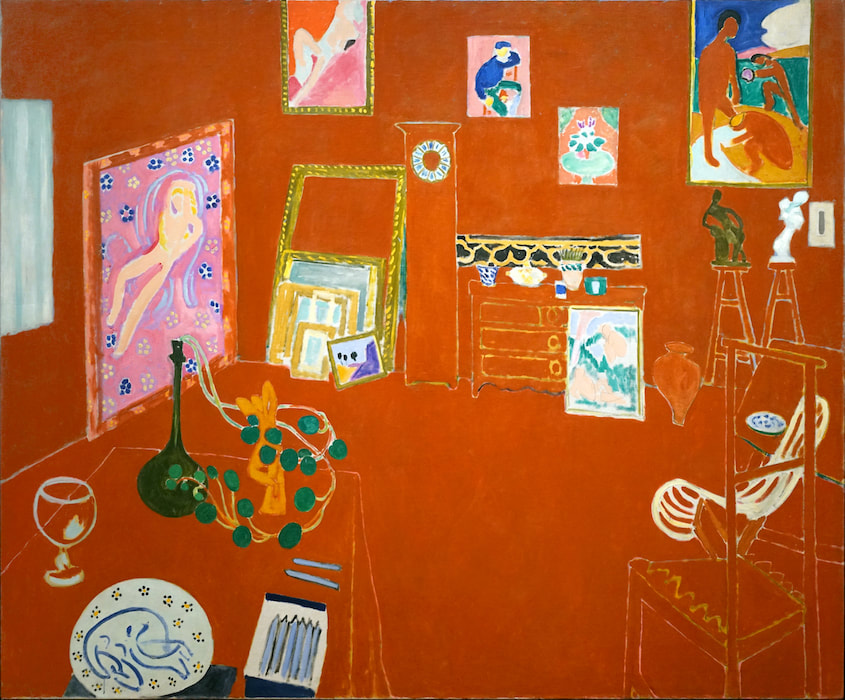|
Model in Love Later there will be postcards – prints of body parts signed in her own meticulous italic, telling how she misses the warm moulding of his hands, that splash of water when she was only possibility. For this, she is grateful and though she might have hoped for arms (or even a head) she is glad of those pubescent breasts with their dab of nipple, the smooth sweep down to staccato buttocks. There will be time enough to tell him that she has let herself go. From her billowing window she dreams of a cluttered atelier: turps, clay, clatter of wire-cutters, plaster of Paris; misses how he came again and again simply to touch the intelligent slope of her shoulder. Other arms have circled her since. Though lovers pluck her as they might a courgette flower (for taste and decoration) still she knows that a girl must be free to walk as she will – that a pedestal impedes, no matter how tenderly it kisses the stems of her feet. Claire Booker This poem was previously published in Magma. Claire Booker lives ten minutes walk from the sea in Brighton (UK) with her husband and two cats. Her work has been published widely in the UK, including in Ambit, Poetry News, The Rialto, The Spectator and Stand. She blogs at www.bookerplays.co.uk
0 Comments
The Heft of Black "All (my) objects are retranslated." Louise Nevelson Eyes grow accustomed to the dark raven on ebony coal landscape onyx shadow. Grid of shapes porch lattice spindle from a chair handle from a shovel small wooden crate slat from a garden gate a barrel head a barrel stave blessings within a box each harmonious to the next. Boxes of beautiful blackness. Don Cellini Don Cellini is a teacher and translator, a poet and photographer, the first two by training, the second by good fortune. His most recent work of poetry is Stone Poems from FootHills Publishing. ArtePoéico recently published his translation of Historia solar/Solar Hisory by Jair Cortés. He believes that Words Transcend Walls. More of his work can be seen at www.doncellini.com Ekphrastic Writing Challenge: Henry Darger Join us for biweekly ekphrastic writing challenges. See why so many writers are hooked on ekphrastic! We feature some of the most accomplished influential poets writing today, and we also welcome emerging or first time writers and those who simply want to experience art in a deeper way or try something creative. The prompt this time is Untitled, by Henry Darger. Deadline is September 6, 2019. The Rules 1. Use this visual art prompt as a springboard for your writing. It can be a poem or short prose (fiction or nonfiction.) You can research the artwork or artist and use your discoveries to fuel your writing, or you can let the image alone provoke your imagination. 2. Write as many poems and stories as you like. Send only your best works or final draft, not everything. Please copy and paste your submission into the body of the email, even if you include an attachment such as Word or PDF. 3. Have fun. 4. USE THIS EMAIL ONLY. Send your work to ekphrasticchallenge@gmail.com. Challenge submissions sent to the other inboxes will most likely be lost as those are read in chronological order of receipt, weeks or longer behind, and are not seen at all by guest editors. They will be discarded. Sorry. 5.Include HENRY DARGER WRITING CHALLENGE in the subject line in all caps please. 6. Include your name and a brief bio. If you do not include your bio, it will not be included with your work, if accepted. Even if you have already written for The Ekphrastic Review or submitted other works and your bio is "on file" you must include it in your challenge submission. Do not send it after acceptance or later; it will not be added to your poem. Guest editors may not be familiar with your bio or have access to archives. We are sorry about these technicalities, but have found that following up, requesting, adding, and changing later takes too much time and is very confusing. 7. Late submissions will be discarded. Sorry. 8. Deadline is midnight, September 6, 2019. 9. Please do not send revisions, corrections, or changes to your poetry or your biography after the fact. If it's not ready yet, hang on to it until it is. 10. Selected submissions will be published together, with the prompt, one week after the deadline. 11. Rinse and repeat with upcoming ekphrastic writing challenges! Saudade The rain arrived as expected. Knowing it would didn’t make the storm any more welcome. Quite the opposite in fact. Still, the inevitable must be accepted to some degree. Besides, with so much to do indoors, Belinha doubted she would’ve even made it outside today. She wanted to wander the park, but the house needed to be made ready. For what, she couldn’t say. Saying made it too real. Perched in a windowsill, she watched the streets empty as pedestrians fled the downpour. A street vendor pulled canvas flaps down, covering her cart, then opened an umbrella. She stood waiting for the rain to stop. If the sun came back, she would be there waiting to shout, “Olhá a bolinha!” The woman reminded Belinha of her mother – determined individuals refusing to flinch in the face of bad news. Unlike her mother’s beauty, that trait, unfortunately, couldn’t be inherited. Belinha liked to think she did her best. How exactly a person is supposed to react to life – everyone knows without any real proof. And though she used to have her own certitude, it seemed lately paixões diagonais induced uncertainty. She used to flow; roots now chained and choked her. Sighing, she mashed out a half-smoked cigarette. An edge still smoldered in the ashtray sending a smoke ribbon skyward; recalling nights in the café listening to fado musicians. They sang of sadness she only wanted to know voyeuristically. Now, those foggily recollected lyrics hit close to home – “Com que voz chorarei?” Belinha drifted downstairs. A maid approached the bottom of the steps. On a silver tray the young girl carried a glass mug, a gift from Belinha’s husband, Lúcio. He sent her a set from Brazil, where he worked overseeing the start of a rubber plantation. He wrote to her often from the heart of the Amazon. Telling her about Manaus changing before his eyes. Electric lights in the savage jungle. His letters filled with tales of rubber baron extravagance. One buys a magnificent yacht somehow inspiring another to purchase a tame lion as a pet. Another waters a horse with champagne. The money flowed, and Lúcio insisted it would carry them to a better tomorrow. Yet, Belinha didn’t see it that way. Shooing the maid away, Belinha gave orders to ready the house. Lúcio returned today. His last letter said he would be back to take her to Manaus. She didn’t want to go to South America – paixões diagonais. Overseeing the servants, Belinha remembered sipping coffee in the café with her friends. That constellation of lost stars guiding to a joyful middle of nowhere; memories of evenings on balconies finding peace in liquor induced silences, when each knew they were at risk of speaking the truth, so no one spoke – dare not confess a longing, a dream, an intention; ask for a kiss, she used to pray, staring at Afonso. They joked about the bourgeois. They felt so certain then – it would never be them. Yet she spun around, dancing alone in the café, while the guitarist played a sad song that somehow made her happy. Belinha bumped into a man, spilling wine on his shirt. He looked at her; she smiled; they laughed – “It’s only a shirt,” he said – and everything changed. No longer the young woman peddling flowers. She would never have to go home, feet burning sore from wandering the city all day for a few réis. She’d never worry about money again. Yet, she couldn’t remember really caring before. Evicted more than once, she slept in the park. The shape of clouds inspiring her dreams. Sometimes she visited friends who were marginally better off. They let her stay a few days until chance offered a new home. It felt like freedom to Belinha. Her mother called it aimless, a childish existence. However, that old woman died in the street. A sunny afternoon, handing over a dozen red roses, her heart stopped. Belinha never wanted that to be her, working all the way to death. There must’ve been a better way. And then oh! there it seemed to be. Lúcio’s smoldering eyes. His tongue dripping honey. He promised her the world. She only wanted a balcony to sit on at night, watch the stars, and echo poetry. They seemed so much the same until they married. That’s when everything changed. He told her she needed to stop going to cafés, especially those full of people he called seedy – she called friends. He informed Belinha she belonged to a better class of people now. She disagreed. He insisted. She… lacked the steely resolve of her mother. So, now, instead of wandering the park in the rain, she stood in a room of their gigantic home. The palace of a future rubber baron. It felt like a mausoleum sometimes – buried alive, dying slowly therein; she stood beside a table arranging flowers. The maid behind her assisted. The two made small talk neither would ever remember. A touch of her past in this moment, Belinha looked at the arrangement; she felt like her mother. It wasn’t nostalgia that hit her. Rather, the blandness of the bouquet. An overwhelming saudade washed over her. She lost her breath. Catching the edge of the table, she couldn’t breathe. “So little colour,” she gasped. The maid grabbed her, expecting her to faint. Belinha pushed the girl away. Clutching at her collar, she ripped open her striped blouse. Staggering towards the front door she shouted, “Let me out!” The sadness of something missing chased her. The ghost waiting to bite saw the chance to sink its teeth into her. But she wouldn’t let it. Instead she flew out into the storm. The downpour drenched her in seconds. Yet she no longer felt herself drowning. “Belinha?” Lúcio, under an umbrella, addressed her in confusion. Waterlogged porters stood behind him carrying his luggage. She looked at him. Her eyes burning coals, she smiled. She said, “I’m going for a walk.” Then she vanished into the rain. J. Rohr J. Rohr is a Chicago native with a taste for history, and wandering the city at odd hours. In order to deal with the more corrosive aspects of everyday life he writes the blog www.honestyisnotcontagious.com and makes music in the band Beerfinger. His Twitter babble can be found @JackBlankHSH. #70-2: Rothko Room- Dupont Circle 1970 The room on 21st Street was always mysterious, luminous, dark, insistent. And in his final months it could have been asked of the artist what he was doing in marking his last days and hours, he, in a sense, sitting on that bench suspended in space with the colours coming off or just falling in with Pollock or de Kooning, losing or winning an abstract debate, rolled in a bar in the 50s. Or could he have been trapped by some beaten down beat notion or desperate song or other drinking story where these motions between the spaces were unresolved, lost in colours or held in reserve in some unknown cavern by the side of his road? Somehow bereft, perhaps scheming day by day with a honed absence and mere drafts of feeling, barely communicable in a language connected to that lost village in the Latvian East. And a cool sun was revealed bright over Washington in an audible red, exhaling orange, green in the room somehow muted and barely visible to the view of a lamentable, confined, intractable state, bright and most luminous, a child’s Russian language haunting in its specificity and convolution asking here about what it might mean in deep America as if to say, “where’s the poetry” with the poet out of the room. Suicides turn in upon themselves with extinction revealed in its altered state and occasionally, perhaps, like to think of themselves free of death, sociable and astute despite imaginations failure at the last, a vacancy in the spirit, the artist lost less form and formulation, trees of depression assembling in a fatal ring. After this, in that room that still sits near the Circle, was seen wild snow and spirits moving deftly from the corners and margins there casting the grey shadow over rarer hues, a deeper wave, a peak on the stretched canvas indivisible from the brush dipping in a can of crazed, cheap materials. Crowded, spacious, intentionally undefined with dialogues interior but forward, deep, still within view, incomprehensible but well sprung from despair, alcoholic, triumphant, opening the sky, filled with volition, spontaneous, rising, drawing the sun and darkness, internal in its self-referential determination, reclusive, restive, peaceful, running down the gallery wall to this small limitless space. Removed to his native grounds, sprawled out in Manhattan, hope and the total absence of hope, torn from form and colour hard upon him from the damp of the North Sea as that lost year showed the artist gone, his form and silence an emblem of a modern time as the old raw figures of the boulevards and towns had been expelled at last fleeing from the foreground, the stark literal banished from a teeming house, hiding just out of sight now below ground. John Huey After a long hiatus and residence overseas John Huey returned the United States and to writing in 2011. Since then he has appeared in numerous on line and print journals as well as three anthologies. His full length collection, The Moscow Poetry File, was published by Finishing Line Press in 2017. www.john-huey.com Discovering My Mother in a Painting by Mary Cassatt She catches me with her half-smile, unconscious delight flowering over her. I finger the single strand around my neck, eyes fixed on the woman with pearls—my pearls, my mother’s. It may be the pastel colour lit by lamps of rosy hue as she looks out from her balcony, or maybe the sheen of her strawberry-blonde hair curled back behind her ear that mesmerizes and transports me to the theatres of my mother’s dancing career, the chandelier casting soft reflections, the rustle of anticipation in the upper tiers before lights dim. I remember her Irish skin—milk-white porcelain, blush that tinted her cheeks. Any minute she might break out in that hearty laugh, infectious to anyone around her. Even in the wake of dying, light glints off her coral scarf and nightgown like the leaps and pliés of her life. I long for my mother, on loan from somewhere else, who’s stopped to linger here for a spell in the Art Institute. Too soon she’ll have to leave again, but here, where shadows are part of light, is where I stand. Mary Jo Balistreri Mary Jo has three full length books of poetry and one chapbook. She was a musician most of her life but due to the death of a grandchild and a consequent loss of her hearing, she turned to poetry. Mary Jo has always been interested in art and received her BA in art from the U. of Pennsylvania. Please visit her at maryjobalistreripoet.com. She lives in Wisconsin. She Stood She stood upstairs. The sun rose. Did he say today, or tomorrow? The baby cried. I am sure he said today. What day was it anyway? Sunlight hit the carpet. If it was the start of the week, it would be tomorrow. And if it was a day into the new week, it would be today. The baby cried. The sun dropped. I am sure he said today. Michael Buckingham Gray This short story first appeared in Flash: The International Short-Short Story Magazine. Editor's note: This is a reverse ekphrasis- the painting was created to go with the flash fiction. Michael Buckingham Gray is a Best Microfiction and a Best Small Fictions nominated writer and creative writing tutor. His writing has appeared in The Fortnightly Review, Flash: The International Short-Short Story Magazine and other magazines. Some places he has tutored at include the University of Notre Dame Australia, Workshop Freo, and Intuition Educational Support. Elle Santarelli has painted throughout Europe as a tool for immersing herself in the different cultures, as a trade for accommodation and a way to understand and relate to the setting. She has painted murals from a hostel in Rome to a surf shop in Morocco, a bar in Spain to the Berlin Wall. Now back in Australia, she has immersed herself in the humble settings of the Mid West and painted Michael Buckingham Gray's flash fiction stories, using similar techniques. She has painted with the youth at STAY and recently completed a mural at the new community centre. Weather Report The lonely streetlight reaches through the half-open window, into the corner office, strokes the white wall, the metal file cabinet, the fine, round ass of the secretary snugged in blue. Its glow casts the words scrawled across the letter in high relief. They shout at the man who clutches the letter in both hands. She’s onto us, he says to his new love, his “true love,” his voice strangled as the words grip his throat. Oh baby, the woman pleads, let’s get out of town, leave this crummy office behind and start fresh. Maybe California? I got a sister in LA. The man doesn’t answer, doesn’t move, silent as the typewriter on her desk a yard away from his, the distance like an ocean for so long, when all he could do was stare into the endless blue of want, adrift on the ship of wife and family until one day she threw him a line: Wanna go for a drink? He’d been drinking her in ever since, each swallow his death and his salvation. The woman has forgotten what she wanted in the files. She clings to the cabinet to keep from falling, her dark eyes smudged with tears. His silence is louder than the first clap of thunder. Grab the umbrella, she thinks, here comes rain. Elya Braden Elya Braden took a long detour from her creative endeavours to pursue an eighteen-year career as a corporate lawyer and entrepreneur. She is now a writer and mixed-media artist living in Los Angeles. Her work has been published in Algebra of Owls, Calyx, Gyroscope Review, Rattle, Willow Review and elsewhere. Her chapbook, Open The Fist, is forthcoming from Finishing Line Press. You can find her online at www.elyabraden.com. Flowers From My Mother She’d watch foxgloves by the window, elegant, erect, preferring partial shade, gladed at untamed garden’s edge. They drew her, out alone in chill air to propagate them on paper, water-coloured as breeze-ripple dipped their heads to her paint, her attentiveness of eye and hand. Transplanted to an indoor nook their vigil of flowering lived the drift of sometimes cherished, sometimes overlooked. Pink blooms pulsed with secrets, plump for the nuzzle of unseen bees. Outdoors, cooling petals wilted into winter, seeds scuffed in soiled darkness. Now framed in my room these silent bells soft-toned as shells, twilight, ghosts are transfigured in a creamy haze of glade no longer wreathed by green-dusk gloom. They stand as she imaged them, centred in a kindness of light, her landscape of mind: Digitalis purpurea, cordial for my heart. On this windless wall they nod again. Julia D McGuinness Julia D McGuinness is a poet, counsellor and writing therapist based in Cheshire, England. She runs writing workshops for creativity and well-being, including work with cancer patients. Her poems have appeared online at Ink, Sweat and Tears, Riggwelter and Amaryllis among others, and in her collection Chester City Walls. In August 2019 she becomes Chester Cathedral’s Poet-in-Residence. You can find her at www.creativeconnectionscheshire.co.uk . Remember the Colour and It Will Float Again A rowboat, ghosted, its lines decaying, questionable, gray. It rests in a cove, confined in a small scrubby wood. Barely a beach. To get to it, move back in time, traversing stunted conifers and by remembering that the sand is rough, cold, remembering colour. Boards, once oiled, smooth and working as one sheened brilliance, are individuals now, faded, objecting. Jagged and hostile, they make themselves known and refuse their work. Back then, Sally’s red and white striped shirt and her glossy black curls, sat opposite and floated on the bay. In a closed room, Matisse drafts rest in a distant corner against a wall. The stories are flat, blurred, abandoned. Faint lines traverse and whisper the space. Angular shadows argue. To find it, remember, the room was red. When he could no longer remember how to paint, Matisse left the room, and cut the world into little pieces of colour, reimagining it so it would float again. Kathryn Douglas Kathryn Douglas has been teaching undergraduate writing for many years and has just completed her MFA in Poetry at Fairleigh Dickinson University. Up until now, Kathryn’s professional focus has been on teaching literature, rhetoric and composition; hers is a new voice in poetry. She loves to read, write, sing, garden, and hike. She has sung Handel’s Messiah in Carnegie Hall and Verdi’s Requiem in Mechanics Hall Worcester, MA. Crammed with bee balm, zinnias, and sunflowers, her garden has been created to attract as many hummingbirds as possible while it nourishes beans grown from seeds carried on the Trail of Tears. She loves taking photos while hiking with her dog, Fred, and her first poetry and photography exhibit will open this September. |
The Ekphrastic Review
COOKIES/PRIVACY
This site uses cookies to deliver your best navigation experience this time and next. Continuing here means you consent to cookies. Thank you. Join us on Facebook:
Tickled Pink Contest
April 2024
|
